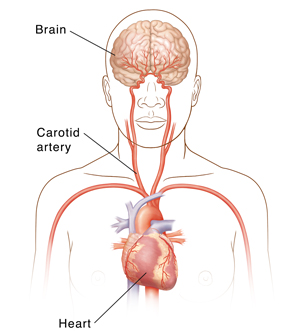A
B
C
D
E
F
G
H
I
J
K
L
M
N
O
P
Q
R
S
T
U
V
W
X
Y
Z
Click a letter to see a list of medical procedures beginning with that letter.
Click 'Back to Intro' to return to the beginning of this section.
Causes of Syncope
Syncope (fainting) has many causes. Sometimes it's not serious. In other cases, it's a sign of a heart problem. But treatment can help.

How to say it
SIHNG-kuh-pee
When syncope is not serious
Most causes of syncope are not serious and may be related to:
-
Strong feelings, such as anxiety or fear. A nerve signal may briefly change your heart rate and lower your blood pressure too much.
-
Standing for too long. Standing will cause blood to pool in your legs. When this happens, your brain may not get all the blood it needs.
-
Standing up too fast. Your blood pressure may not adjust fast enough to changes in posture and may drop too low. Certain medicines can also cause this problem. Some medicines that can cause a drop in blood pressure include diuretics, blood pressure medicines, and medicines for chest pain.
-
Reaction to normal body functions. When you go to the bathroom, have gastrointestinal discomfort, upset stomach (nausea), or pain, your heart may have a natural reflex to slow down and lower blood pressure. This can result in syncope. This may also follow exercise, eating, laughter, weight lifting, or playing musical instruments like the trumpet or trombone.
When heart trouble causes syncope
A heart problem can lower the amount of oxygen-rich blood that gets to the brain. Heart trouble can be serious and even life-threatening if not treated. Some of these conditions include:
-
A slow heart rate. Electrical signals tell the chambers of the heart when to pump. But the signals may be slowed or blocked (heart block) as they travel on the heart’s electrical pathways. This can be caused by aging, scarred heart tissue, or damage from heart disease. When the heart rate slows, not enough blood is pumped.
-
A fast heart rate. Some things can make the heart race. For instance, a heart attack can create abnormal electrical signals. These signals can make the heart suddenly beat very fast. The heart pumps before the chambers can adequately fill with blood. So less blood gets to the brain and other parts of the body. Illegal drugs, certain medicines, heart disease, or an inherited condition can also cause this.
-
A heart valve problem. Blood travels through the chambers of the heart as it pumps. Heart valves open and close to help move blood in the right direction. But a hardened or scarred valve may not open or close fully. As a result, less blood is pumped through the heart to the brain and body. Most often, syncope occurs when a person's aortic valve is narrowed and they do strenuous activity.
-
A heart muscle problem. Some people develop a thickened heart muscle that blocks blood flow out of the heart to the body (called hypertrophic cardiomyopathy). Being dehydrated and having this condition can raise the risk for syncope.
-
A cardiovascular problem. Blood clots in your lungs or sudden increase in blood pressure in the vessels in the lungs can also prevent correct flow of oxygenated blood to the brain.
Whatever the cause of syncope, it's important to see your healthcare provider. You may need to be seen by a cardiologist or neurologist. If you have syncope and haven't been seen by a provider yet, it's important to:
Online Medical Reviewer:
Ronald Karlin MD
Online Medical Reviewer:
Stacey Wojcik MBA BSN RN
Online Medical Reviewer:
Steven Kang MD
Date Last Reviewed:
3/1/2024
© 2000-2024 The StayWell Company, LLC. All rights reserved. This information is not intended as a substitute for professional medical care. Always follow your healthcare professional's instructions.